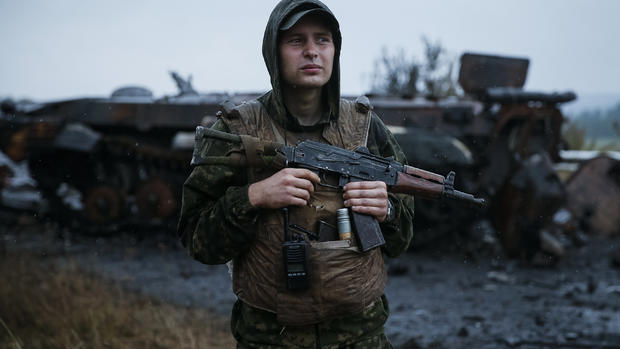Growing threat of Russia invading Ukraine, Hagel says
STUTTGART, Germany -- Russia's troop buildup on the Ukrainian border increases the threat of an invasion by President Vladimir Putin's army, Defense Secretary Chuck Hagel said Wednesday.
Speaking to reporters at U.S. European Command in Stuttgart, Germany, Hagel said he agrees with Poland's foreign minister, who said Wednesday that the increase in Russian forces near Ukraine's border heightened the risk of an invasion.
"I think it's a reality, of course it is," said Hagel, who was in Stuttgart for meetings with his military leaders in Europe, including the top commander, Air Force Gen. Philip Breedlove. "When you see the build-up of Russian troops and the sophistication of those troops, the training of those troops, the heavy military equipment that's being put along that border, of course it's a reality, it's a threat, it's a possibility - absolutely," Hagel said.
U.S. and NATO officials say there are now about 20,000 Russian troops massed just east of Ukraine's border. CBS News' David Martin reported last week that U.S. officials believed there were approximately 15,000 in the region.
The U.S. also says Russia continues to train and equip separatists battling Ukraine's government.
Russia has repeatedly rejected Ukrainian and Western claims of a military buildup on the border.
"The longer that Russia perpetuates and instigates this tension and the possibility of escalating their activity, it's going to get worse. And we have to be prepared for that," Hagel said.
Among the scenarios that worry some in NATO is Putin potentially sending Russian troops into eastern Ukraine in the guise of a "peacekeeping" force. That concern has deepened as the Russian-supported separatists appear to lose the initiative against Ukrainian government forces.
Hagel also said that Russia's provocative actions are forcing the U.S. and its allies to take a close look at how NATO is structured and prepared for such military crises and other challenges of the future.
U.S. officials have talked about the need to set up a more robust and ready NATO military response force. That is likely to be one of the subjects discussed at the NATO summit in September. Sir Adrian Bradshaw, the British army general who is NATO's No. 2 officer, said last week the alliance needs a more responsive quick-reaction force that could be deployed in the event Moscow makes aggressive military threats against a NATO nation.
Breedlove in June told reporters that NATO needs "to have a much more responsive force to address this new threat that we see." He said the allies will consider where the force should be positioned and whether it should move in and out on a rotational basis or remain in the region as long as needed.
He said he has recommended that NATO consider prepositioning military equipment in the region, but no final decisions have been made yet.
Meanwhile, Putin has ordered government agencies to restrict imports of food and agricultural products from the countries that have imposed sanctions against Russia over the conflict in Ukraine.
The text of Putin's decree released by the Kremlin on Wednesday says that such imports will be "banned or limited" for one year. The decree doesn't name any specific countries or products, but contains an order to government agencies to spell them out.
The move follows the latest round of sanctions against Russia imposed by the European Union last week, which for the first time targeted entire sectors of the Russian economy.
The U.S. and the EU have accused Russia, which annexed Ukraine's Crimean Peninsula in March, of fomenting tensions in eastern Ukraine by supplying arms and expertise to a pro-Moscow insurgency, and have imposed asset freezes and loan bans on a score of individuals and companies.
Russia depends heavily on imported foodstuffs - most of it from the West - particularly in the largest and most prosperous cities such as Moscow.
The order says the limits are being imposed "with the goal of guaranteeing the security of the Russian Federation" and calls for undertaking measures to guard against quick price hikes. Both those clauses appeared to indicate that the scope of the measures wouldn't be wide.
